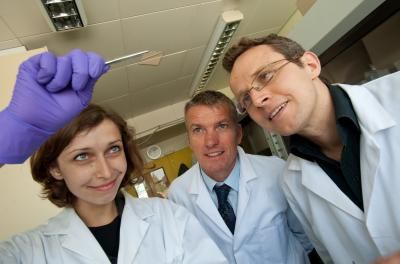Researchers develop golden window electrodes for organic solar cells
Researchers at the University of Warwick have developed a gold plated window as the transparent electrode for organic solar cells. Contrary to what one might expect, these electrodes have the potential to be relatively cheap since the thickness of gold used is only 8 billionths of a metre. This ultra-low thickness means that even at the current high gold price the cost of the gold needed to fabricate one square metre of this electrode is only around £4.5. It can also be readily recouped from the organic solar cell at the end of its life and since gold is already widely used to form reliable interconnects it is no stranger to the electronics industry.

University of Warwick chemistry Ph.D. student Helena Stec with some ultra-thin gold film, watched by professor Tim Jones, chemistry, and Dr. Ross Hatton, chemistry.
University of Warwick
Organic solar cells have long relied on Indium Tin Oxide (ITO) coated glass as the transparent electrode, although this is largely due to the absence of a suitable alternative. ITO is a complex, unstable material with a high surface roughness and tendency to crack upon bending if supported on a plastic substrate. If that wasn't bad enough one of its key components, indium, is in short supply making it relatively expensive to use.
An ultra-thin film of air-stable metal like gold would offer a viable alternative to ITO, but until now it has not proved possible to deposit a film thin enough to be transparent without being too fragile and electrically resistive to be useful.
Now research led by Dr Ross Hatton and Professor Tim Jones in the University of Warwick 's department of Chemistry has developed a rapid method for the preparation of robust, ultra-thin gold films on glass. Importantly this method can be scaled up for large area applications like solar cells and the resulting electrodes are chemically very well-defined.
Dr Hatton says "This new method of creating gold based transparent electrodes is potentially widely applicable for a variety of large area applications, particularly where stable, chemically well-defined, ultra-smooth platform electrodes are required, such as in organic optoelectronics and the emerging fields of nanoelectronics and nanophotonics"
Most read news
Other news from the department science

Get the chemical industry in your inbox
By submitting this form you agree that LUMITOS AG will send you the newsletter(s) selected above by email. Your data will not be passed on to third parties. Your data will be stored and processed in accordance with our data protection regulations. LUMITOS may contact you by email for the purpose of advertising or market and opinion surveys. You can revoke your consent at any time without giving reasons to LUMITOS AG, Ernst-Augustin-Str. 2, 12489 Berlin, Germany or by e-mail at revoke@lumitos.com with effect for the future. In addition, each email contains a link to unsubscribe from the corresponding newsletter.



























































